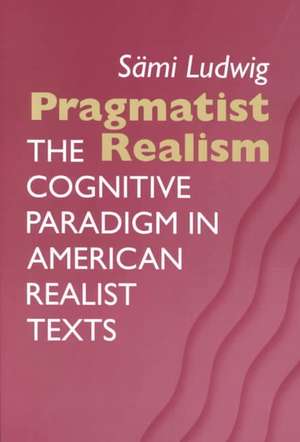Pragmatist Realism: The Cognitive Paradigm In American Realist Texts
Autor Sami Ludwigen Limba Engleză Paperback – 20 iun 2002
Literary realists have often been dismissed by later writers of the modernist and post-structuralist schools for their lack of aesthetic sophistication and etymological naïvete. In Pragmatist Realism, Sämi Ludwig argues that the artistic quality of realist texts is better appreciated by approaching them from a cognitive perspective, rather than from a linguistic or formalist one.
Ludwig notes that literary realism arose from the same cultural scene as the pragmatist philosophy of William James and Charles Sanders Peirce, and that cognitive psychology built upon pragmatist philosophy. He argues that the aim of realist writers, like that of cognitive scientists, is to track the arc of learning from experiences. Ludwig contends that this cognitive perspective is a useful corrective to other approaches to literary criticism that focus on textual hermeneutics. He argues further that the cognitive paradigm can enhance our understanding of literary representation, not only in realist works by Mark Twain, William Dean Howells, Henry James, Charles Chesnutt, and others, but in literature generally.
Ludwig notes that literary realism arose from the same cultural scene as the pragmatist philosophy of William James and Charles Sanders Peirce, and that cognitive psychology built upon pragmatist philosophy. He argues that the aim of realist writers, like that of cognitive scientists, is to track the arc of learning from experiences. Ludwig contends that this cognitive perspective is a useful corrective to other approaches to literary criticism that focus on textual hermeneutics. He argues further that the cognitive paradigm can enhance our understanding of literary representation, not only in realist works by Mark Twain, William Dean Howells, Henry James, Charles Chesnutt, and others, but in literature generally.
Preț: 173.48 lei
Preț vechi: 199.10 lei
-13% Nou
Puncte Express: 260
Preț estimativ în valută:
33.20€ • 36.17$ • 27.97£
33.20€ • 36.17$ • 27.97£
Carte indisponibilă temporar
Doresc să fiu notificat când acest titlu va fi disponibil:
Se trimite...
Preluare comenzi: 021 569.72.76
Specificații
ISBN-13: 9780299176648
ISBN-10: 0299176649
Pagini: 320
Dimensiuni: 152 x 229 x 18 mm
Greutate: 0.43 kg
Ediția:1
Editura: University of Wisconsin Press
Colecția University of Wisconsin Press
ISBN-10: 0299176649
Pagini: 320
Dimensiuni: 152 x 229 x 18 mm
Greutate: 0.43 kg
Ediția:1
Editura: University of Wisconsin Press
Colecția University of Wisconsin Press
Recenzii
"An extraordinary critical analysis of the realist movement. Richly informed by philosophy and history and full of keen (though sometimes controversial) insights, Ludwig’s work is a major contribution to American literary criticism and literary history and will earn him a place among the leaders of American literary studies."—Emory Elliott, University of California, Riverside, editor of The Columbia History of the American Novel
"Pragmatist Realism offers an unprecedented synthesis of the ‘cognitive paradigm,’ stretching from first-generation pragmatists, through Piaget and other cognitive psychologists, to recent research in cognitive science. Ludwig’s argument—that American literary realism can be illuminated by being placed in the context of this cognitive paradigm—is original and persuasive."—Jonathan Levin, Fordham University, author of The Poetics of Transition
Notă biografică
Sämi Ludwig teaches in the English Department at the University of Berne in Switzerland and has been a visiting fellow at Harvard University, the University of California, Berkeley, and the University of California, Riverside. He is the author of Concrete Language: Intercultural Communication in Ishmael Reed and Maxine Hong Kingston
Descriere
Literary realists have often been dismissed by later writers of the modernist and post-structuralist schools for their lack of aesthetic sophistication and etymological naïvete. In Pragmatist Realism, Sämi Ludwig argues that the artistic quality of realist texts is better appreciated by approaching them from a cognitive perspective, rather than from a linguistic or formalist one.
Ludwig notes that literary realism arose from the same cultural scene as the pragmatist philosophy of William James and Charles Sanders Peirce, and that cognitive psychology built upon pragmatist philosophy. He argues that the aim of realist writers, like that of cognitive scientists, is to track the arc of learning from experiences. Ludwig contends that this cognitive perspective is a useful corrective to other approaches to literary criticism that focus on textual hermeneutics. He argues further that the cognitive paradigm can enhance our understanding of literary representation, not only in realist works by Mark Twain, William Dean Howells, Henry James, Charles Chesnutt, and others, but in literature generally.
Ludwig notes that literary realism arose from the same cultural scene as the pragmatist philosophy of William James and Charles Sanders Peirce, and that cognitive psychology built upon pragmatist philosophy. He argues that the aim of realist writers, like that of cognitive scientists, is to track the arc of learning from experiences. Ludwig contends that this cognitive perspective is a useful corrective to other approaches to literary criticism that focus on textual hermeneutics. He argues further that the cognitive paradigm can enhance our understanding of literary representation, not only in realist works by Mark Twain, William Dean Howells, Henry James, Charles Chesnutt, and others, but in literature generally.
